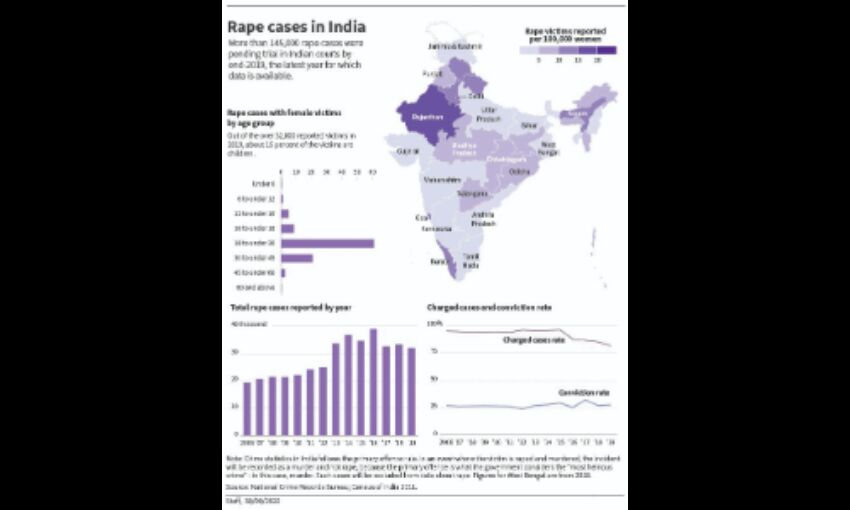Protecting minors
The contentious Bombay HC interpretation of the POCSO Act has been thankfully stayed by the apex court; it’s time for gender sensitisation of the judiciary

Seasons change, years come and go by, new crises appear and dissipate every day…but some issues linger on almost in perpetuity. It's 2021, and crimes against women and children continue to be one such inexorable problem in India that only increases every year. Higher cases of violence may mean greater reporting of offences but also reflects, through data and statistics, the alarming growth of these crimes, too many directed towards minor girls to be overlooked as an anomaly. Every few months, a rape or gangrape more heinous than the last one emerges that shocks us to the core. The latest was a 13-year gang-raped in Madhya Pradesh thrice by nine men in less than a day.
A simple Google search throws up hundreds of cases of crimes against women from all across the country but most from Uttar Pradesh, Madhya Pradesh, and Rajasthan. The states with the highest number of crimes against girl children are Rajasthan, Maharashtra, and Madhya Pradesh, according to the National Crime Records Bureau (NCRB). The mind and soul grow weary reading the same headline over and over again. An iron will be needed to describe in words the bestiality that accompanies some of these rapes. And mind you, only the most gruesome rapes get reported; there are thousands of cases of other kinds of violence against children that don't even make it to the news space. Sexual assault or assault with intent to outrage her modesty are some of the top instances of crimes against women, extending most likely even to girl children. A worrying number is the spike in crimes against children – a jump of 4.5 per cent in 2019 in comparison to 2018. 1.48 lakh cases of crimes against children were reported in 2019.
In this worrying clime of dubious safety and security of women and girl children in India, two court orders passed by the same Bombay High Court Judge, Justice Pushpa Ganediwala, in January proved irksome. In one case she ruled that groping a minor girl's breasts over the clothes was not sexual assault as there was no "skin-to-skin contact with sexual intent". In another case, she ruled that holding hands of the victim and opening pant zip also doesn't count as sexual assault. In yet another incredulous order, this time passed by Madhya Pradesh High Court, bail was granted to the accused on the condition that he gets a 'rakhi' tied by the victim. What mockery of our laws is this?
All three orders pose a danger of diluting laws that are in place to safeguard women and minors, most specifically the Protection of Children from Sexual Offences (POCSO) Act. If these laws are not implemented strictly, it could lead to an even further increase in crimes against women and children. If perpetrators have no fear of the law or retribution, then crimes against women will only surge. Awareness, education, sensitisation of men are indeed the long game but in the short-term, it's the law of the land that must set the tone.
Thankfully, the Supreme Court has stepped in and stayed one contentious order that had ruled that groping of a minor without skin contact wasn't sexual assault. The bench comprising Chief Justice of India S A Bobde and Justices A S Bopanna and V Ramasubramanian stayed the High Court order. It was brought up by Attorney General K.K. Venugopal who rightly termed the judgement as "unprecedented" and "likely to set a dangerous precedent". Ever since the order was passed, child rights activists have been up in arms. The National Commission for Protection of Child Rights even urged the Maharashtra government to challenge the order. The furore is not misplaced as the order changed the punitive charges against the perpetrator. Not deeming groping over clothes as sexual assault meant a decrease in the sentence from three years of imprisonment to just one.
The Supreme Court's intervention in this matter is welcome but also proves the urgency for gender sensitisation of the judiciary. The endeavour to protect India's children and women can't be achieved overnight. But we must fight to at least protect the laws from being watered down while verdicts are passed, as they remain a key factor in ensuring that the guilty are punished, and punished hard.
I can't help but ponder what sort of people think that groping over clothes and unzipping pants in front of a minor are not examples of sexual assault? Should the minors' parents wait till the accused's hands went under the clothes or his pants came off? The intention was to assault a minor, and that intention needs to be punished as well. If we think groping is not sexual assault, then we are part of the same people who tell the children in their family not to complain about that pervy relative who routinely gropes them or ignore the sexual deviant on the bus who fondles their breast or pinches their bum. Most cases of sexual abuse, especially to minors, happen at the hands of known people — relatives, cousins, neighbours, family friends, domestic staff. These are people who have regular access to the house and the kids. Not only girl children, but there are also instances of minor boys being sexually assaulted and abused as well. At a time when we need to educate our children even more about 'good touch' and 'bad touch', our judicial institutions can't be passing on mixed messages.
The writer is an author and media entrepreneur. Views expressed are personal



